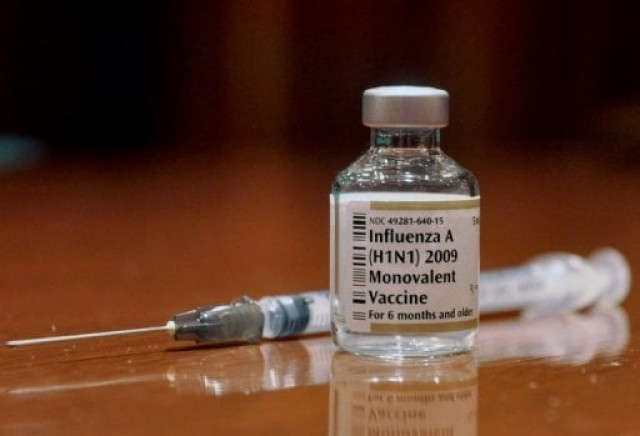NIH issues influenza advisory
Doctors told to stay vigilant for suspected symptoms; issues advice for precaution

PHOTO: AFP
The general public has also been advised to take precautions to avoid the disease.
The Field Epidemiology and Disease Surveillance Division (FEDSD) of the National Institute of Health (NIH) in Islamabad issued an advisory on Infulenza A(H1N1)pdm09 cases on Wednesday.
The advisory urged healthcare authorities and facilities to strengthen and improve their level of preparedness in preventing, controlling and managing influenza.
NIH directed all health professionals to remain vigilant in detecting any suspected influenza-like illness and severe acute respiratory infection (SARI) cases.
So far 28 cases of influenza have been reported from Islamabad, Lahore, Multan, and Gilgit-Baltistan.
Once called bird flu and considered deadly, it is no longer dangerous with the World Health Organisation terming it as the seasonal flu.
“Over the past two years, the virus has been less aggressive and more akin to the seasonal flu,” said FEDSD Chief Dr Jameel Ansari, adding that it does not cause death but it can put the lives of those already suffering from chronic diseases at risk.
According to the advisory, pregnant women, the elders, very young, overweight, obese, immune compromised and people with chronic health problems like asthma, diabetes, cardiac and lungs diseases are at high risk of developing complications due to Infulenza A(H1N1)pdm09 .
If someone is sick or has been in close contact with persons having a flu-like illness, the advisory recommends some preventive measures to limit Infulenza A(H1N1)pdm09 transmission.
These include frequent and thorough washing of hands with soap and water or hand sanitizer, avoid touching your nose, mouth or eyes as the virus survives on common surfaces, take rest, avoid crowds, covering the mouth and nose when sneezing or coughing — cough or sneeze into a tissue or the inner crook of your elbow, avoid contaminating your hands and take other social distancing measures.
For children, they should stay at home and avoid school, avoid mixing and playing with other children.
The advisory said that vaccination was the most effective way to prevent an infection or severe outcomes of influenza, particularly in high-risk groups.
The WHO recommends seasonal influenza vaccination for pregnant women (highest priority), children between the ages of 6-59 months, elderly people, individuals with chronic medical conditions and health-care workers.
Published in The Express Tribune, December 28th, 2017.



















COMMENTS
Comments are moderated and generally will be posted if they are on-topic and not abusive.
For more information, please see our Comments FAQ